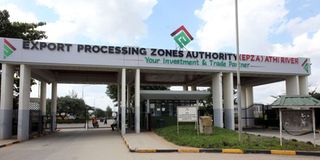Premium
Resetting our development discourse

The entranace to the Export Processing Zones Authority (EPZA)in Athi River, Machakos County, as pictured on June 24, 2020.
What you need to know:
- Some economists argue that the emerging development model for Africa may never follow the traditional progression from agrarian economy through industrialisation and the service economy.
- Africa’s median age is 19 while Europe’s is 50. Japan’s population is aging and so is the situation in many other Asian countries except South and Southeast Asian countries. What will make Africa compete with these Asian countries is good education and willingness to work hard.
My column last week centered on the prevailing political debate in the country. I warned that it was pointless to use divisive language and argued that politicians should instead be propounding ideas that matter.
Politics is not my forte but I can tell what good politics is. I also know what ideas can change our country for the better. If by accident I were to be a national politician, my manifesto will have just three items: Value addition and by extension manufacturing, fostering national innovation systems and provision of best public services (education, health and social protection).
These are not just my creations. From wide reading, it is clear that these three could change the future of Africa. Therefore, these issues will have a sustainable impact that will propel not just the country but the entire continent into a prosperous future. That is if we keep pace with the rapid changes.
Some economists argue that the emerging development model for Africa may never follow the traditional progression from agrarian economy through industrialisation and the service economy. From the demographic reviews, there is a case for manufacturing. This is because manufacturing will create lots of employment opportunities for the burgeoning youth population. For this to happen, we must have a well-educated and productive youth willing to add value to all of our abundant raw materials.
Transforming raw materials into products depends on the kind of human resources we produce from universities. I recall that during my student years in the US, most classes were dominated by students from Korea, Singapore, Taiwan, China and Malaysia, a huge number of who were government sponsored. Many of them went back to teach at institutions of higher learning, thus helping their countries develop world class human resources.
This prepared the groundwork for the rapid growth of these countries for when Western countries started to outsource manufacturing to those countries, there were abundant well-educated youth. In the end they became the Newly Industrialised countries. When India’s diaspora started to go back to their motherland, India’s fortunes started to change that its branding changed from Incredible India to Make in India. India’s formative stages in industrialisation was micro food processing then pharmaceuticals and now into heavy industry.
Applied learning
As I write this article, Africa’s median age is 19 while Europe’s is 50. Japan’s population is aging and so is the situation in many other Asian countries except South and Southeast Asian countries. What will make Africa compete with these Asian countries is good education and willingness to work hard.
As such, there is need to change most of the universities into applied learning institutions and linking them to communities for the purpose of production of goods (value addition) especially in micro food processing to minimise the losses we now experience.
We also introduce a system of rewarding faculties that will innovate around their areas of expertise and publish their works and provide incentives to students who actively work with communities to create value for local consumption and exports.
Liberal arts faculties too must have output targets in terms of content development for cultural transformations. From sociology to psychology to political science and anthropology, they should be engines of producing local content for sustainability of some aspects of our cultures.
The political discourse in the country degenerated into the tribal diatribes we have today when literally output at universities died with the departure of the likes of Ngugi wa Thiong'o, Miceere Mugo, Okot p'Bitek and their ilk.
We are in a downward trajectory unless we restore the freedoms of speech and academia’s role in society. The proposal here of linking production and innovation to universities is not a new concept. Universities around the Silicon Valley are actively involved in commercialisation of research to supplement their revenue sources.
Innovation
This is what we had envisaged in Konza City. That if there was going to be the production of light electronic products, we had to have a serious innovation ecosystem supported by universities. That dream can be realised if promotion of engineering faculty is linked to new innovations in an ecosystem that fosters innovation. Local universities should emulate the Korean Advanced Institute for Science and Technology which is now building a campus at Konza.
The linking of universities and yes, Technical Vocational Education and Training Institutions (TVET), to production and innovation has practically demonstrated that institutions of higher learning can partly finance their budgets from commercialising their research and create employment and wealth in the process. Most successful universities earn a significant amount of their revenue from the patents they register and from the businesses they incubate.
That does not mean that things will just happen. The policymaking must be able to accommodate failure and mistakes for innovation to flourish as well as attract other innovators to relocate here.
Success in innovation requires risk taking. Closely related to this is the fact that nothing happens in isolation. You may require engineers working with sociologists to innovate an acceptable product. Agriculture alone, for example, cannot succeed if we fail to link it to industrialisation. It is this disconnect that breeds the problems we continue to have.
Public services
Let me now explain why I prioritise public services and by these, I mean education, health and social protection. If these three items are taken care of, poverty reduction will improve by several factors. Investment in health and educational facilities will lessen the demand for people seeking expensive private education as well as health. Covid-19 has demonstrated that it is not the money that creates the best of what we need.
We are now learning that simple hygiene on hand washing could solve our perennial sickness from the colds. We must take a step further and ensure that we develop first class public health to prevent diseases from attacking people. As they say, “prevention is always better than cure.”
The investment in education and health should not be for curative purpose only but for putting more emphasis on public health. We would rather spend more in creating a clean environment than have patients in hospitals.
I will deal with health and social protection next week and explain further how my agenda builds upon several other key areas of development. My sole purpose of doing this is not to offer myself as a candidate for any office but to simply precipitate discussion that can bring meaningful change to our beloved country.





